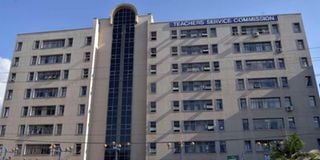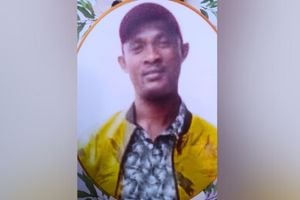TSC bid to tackle teacher shortage in special schools

The Teachers Service Commission (TSC) headquarters in Upper Hill, Nairobi.
The Teachers Service Commission will recruit 3,600 teachers for Special Needs Education (SNE) centres in three phases to address the acute shortage in the institutions.
The number of teachers in special schools has been dwindling as some of the teachers originally assigned to the institutions have moved to regular schools "where career progression is almost guaranteed".
The teachers' employer has revealed that 1,763 teachers have already been recruited and posted to the schools and the remaining batch will be recruited between September 2024 and June 2025 due to budgetary constraints.
"Due to budgetary constraints, TSC has developed a phased deployment of teachers to special needs schools to address the shortage," revealed TSC chief executive officer Nancy Macharia when she appeared before the National Assembly's Cohesion and Equal Opportunities Committee.
"In the month of May 2024, TSC has recruited and deployed 1 763 teachers to schools. A further 3 600 teachers will be deployed to schools in September 2024, January and June 2025," she added.
Ms Macharia told the Adan Haji-led committee that special schools in the country were facing a shortage of 5,362 teachers.
She added that the commission had also developed and implemented a unique staffing norm for special schools.
Ms Macharia said class sizes were determined by the nature and severity of the learners' disabilities, which were taken into account for each teacher.
"For example, the class size for learners with intellectual disabilities is set at four, while the class size for learners with physical disabilities should be 15," she said.
She added that the move is aimed at ensuring that teachers give adequate attention to students with special needs.
"The lower the number of special needs learners per teacher, the better for the provision of quality services," Ms Macharia said.
The agreement to employ the teachers was reached between the Kenya Union of Special Needs Education Teachers (Kusnet) and the Teachers Service Commission (TSC) during a meeting in Naivasha last year.
At the same time, the TSC announced the introduction of allowances for teachers in special schools to attract and retain them in the institutions.
Ms Macharia revealed that a Reading Facilitation or Aid allowance has been introduced for teachers who are blind, deaf, dumb or physically challenged.
"Special schools allowance is also another incentive introduced to teachers with special education skills,"said Ms Macharia.
She added: "These incentives are in addition to the standard allowances such as hardship and commuting among others as a way of recognising the additional challenges faced by teachers.
Shinyalu MP Fred Ikana a member of the committee said the suffering by teachers in special needs schools discouraged their colleagues from seeking jobs in the institutions leading to the shortage.
The committee's vice chairperson Liza Chelule commended the commission for its efforts to better the welfare of teachers in special needs schools but added that there was still more needed to be done.
"The committee visited special needs schools in parts of Coast, Nyanza, Western and Rift Valley and established that the schools and teachers operated in deplorable conditions," said the Nakuru County Member of Parliament.
In September last year, the Senate Committee on Education raised concerns over what it termed as-unfair treatment of pupils and students living with disabilities, as well as the staff that handles them, by the Ministry of Education.
The lawmakers who spoke at the Lake Naivasha Resort, during a consultative workshop with the Ministry of Education, revealed that since 2018, the government had failed to review capitation fees for the special schools, which host thousands of minors across the country.
The committee rejected a proposal by the Ministry of Education to charge parents whose minors have special needs when the committee felt that the parents should not pay any money to increase the capitation grant.
The committee rejected the proposal that a parent pay Sh9,500 for some categories of learners with special needs to increase the capitation grant.
The senators noted that the ratio of teachers and supervisors to learners in the institutions was also inadequate.
During the meeting, nominated Senator Peris Tobiko revealed that a 2018 proposal by the ministry to review the capitation grants to schools was never presented to Cabinet for approval.
"There is need for an increased allocation to fund the differentiated unit cost model that was developed in 2018 to ensure that schools are adequately funded," Ms Tobiko added during the meeting.
It was also revealed that the outstanding payments owed to staff at the special schools amounted to Sh6,319,225, which is 22 months in arrears.
During the meeting, it was also revealed that the annual allocation to special and integrated boarding schools and units has remained the same for the past six financial years at Sh655 million, which is shared equally among learners with special needs, except those with deafness and blindness.
Learners with deaf-blindness receive Sh29,662 annually, while those with other disabilities receive Sh10,284.
There are currently 43,266 learners in special boarding schools.
The Senators urged the Ministry of Education to ensure that learners with special needs are provided with adequate infrastructure to facilitate access to classrooms and other facilities in schools, as well as appropriate learning aids.





